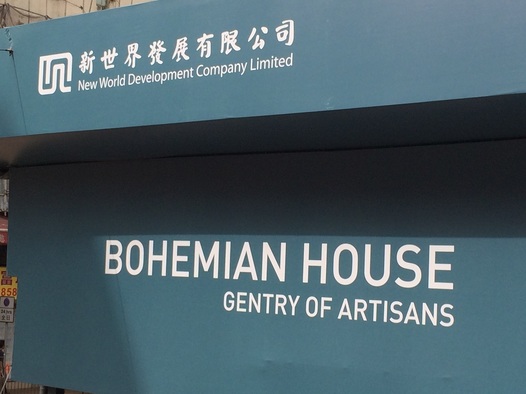|
I spotted this sign the other day along Des Voeux Road West, announcing a new property development going up on the site. It looks like the developer asked a PR agency to develop a catchy name and slogan that would suggest a sense of classiness and prestige. Unfortunately, the PR agency's attempts have failed completely! But why? Let's start with the answer to that question, and then explore it in a bit more detail:
What do we mean by saying that the word bohemian, gentry, and artisan have meanings that are 'incompatible and contradictory'? In short, the core meanings of these words cancel each other out — they are what we call “oxymorons" in English. This happens even though all three words do indeed carry certain very high-value positive connotations in addition to their core objective meanings:--
However, we cannot divorce the *connotations* of the words from their *core meanings*. Each of these words refer to a class or type of person. And these three classes of people are extremely incompatible in real life terms! A bohemian person is not bound by the conventions of society, but a member of the gentry is by definition the product of social conventions (i.e. the class system). This means that it is pretty much impossible for a person to be a member of the gentry and a bohemian at the same time. In the same way, a person who is an artisan is basically a worker, no matter how skilled. But if you are a member of the gentry, you don't work -- you don't need to. So it is also pretty much impossible for a person to be a member of the gentry and an artisan at the same time. In summary, when we explore the core definitions of these words, we find that it is almost impossible for the groups of people being described by these three words to overlap. What this shows is that we cannot choose words merely for their connotations. The connotations must be firmly anchored to the underlying meanings of the words, otherwise we will produce expressions like this that English speakers find confusing and rather silly. What kind of people is the developer expecting to live here? It sounds like it is aimed at people who do not, and cannot, exist!
0 Comments
Your comment will be posted after it is approved.
Leave a Reply. |
About this blogThis blog arises from keeping an eye on English in Hong Kong. I often use signs, notices and advertisements that I see as starting points to write about English issues that commonly challenge Hong Kong writers. Archives
October 2017
Categories
All
|


 RSS Feed
RSS Feed